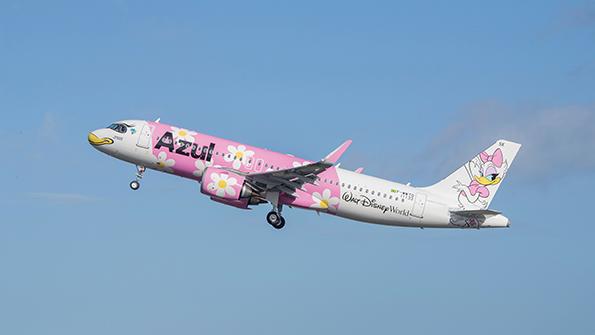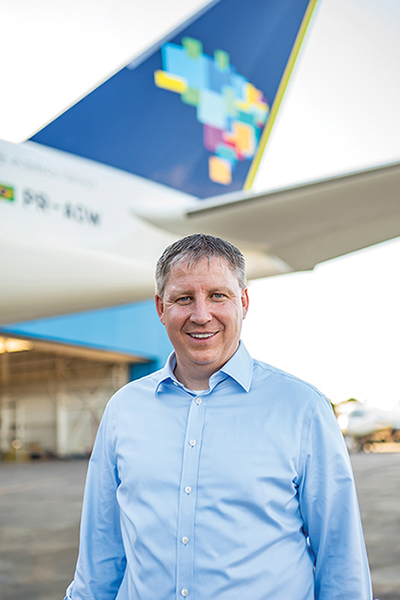
Azul has a history of introducing special liveries, including four A320neo family aircraft featuring Disney characters.
At just 15 years old, Azul is now Brazil’s largest airline, serving over 160 destinations domestically and in the US and Europe. The carrier grew rapidly by launching services to Brazilian markets previously underserved or unserved by air transport in the road infrastructure-challenged nation. Azul has built a diverse fleet. It was the launch customer and is the largest operator of Embraer E195-E2s, which are replacing older E195s. Airbus A320neos, ATR 72s and Cessna Caravans are deployed predominantly on domestic services, with A330neos/ceos dispatched to Paris, Lisbon, Fort Lauderdale and Orlando. CEO John Rodgerson has been at Azul since its inception and has helmed the airline since 2017. Rodgerson and a cohort of other executives followed David Neeleman from JetBlue in 2008 to launch Azul.
What are the opportunities of operating in Brazil? People don’t realize that Brazil is the size of the continental US. There are a lot of growing cities, cities that maybe 15 years ago didn’t exist. And they exist today because of the migration of the agribusiness in Brazil into the midwest. We came to Brazil because nobody was flying regionally. LATAM and GOL, two very good airlines, had a 98% market share. But one interesting thing, and it hasn’t changed in 15 years, is that 92% of their seats hit only three cities. They either start or land in Rio de Janeiro, Brasília or São Paulo. We fly today to 160 cities in the country where our competitors are at roughly 50. That was the tremendous opportunity in Brazil.

What are the challenges? Brazil gets in its own way. They do some things that I quite frankly don’t think are good for Brazil. And so Brazilians still travel less than Mexicans, Colombians and Chileans. One of the reasons is, jet fuel in Brazil is the most expensive jet fuel anywhere in the world. They have a tax on a statewide basis on jet fuel. And so jet fuel prices end up being about 30% more expensive than anywhere else. The other big challenge is it’s a very litigious society. We have 3% of the world’s flights, but we have 90% of the world’s lawsuits for aviation. It’s a challenging environment in that sense.
What is your growth strategy and your network focus areas? Let’s talk about international expansion. We got widebodies before we got A320s and a lot of people thought we were just out of our minds, right? But we were waiting for the A320neos and there were A330ceos that were available in the market. People ask why are we flying to Fort Lauderdale and Orlando? It’s because those are two Brazilian cities. It’s so cultural for Brazilians to fly to South Florida. Then we put flights into Lisbon. We have a partnership with TAP and a codeshare there. Brazilians love to start their European trip going to a country that speaks the same language. We just launched services to Paris Orly and that’s going really well. A lot of people say, ‘Geez, John, you’re in Paris and Lisbon but you don’t fly to Buenos Aires.’ We fly to where Brazilians want to fly, so you don’t see us doing a lot of stuff intra-Latin America—it’s very well-served. Our strategy is based around where we’re strong and going to where our partners are strong. JetBlue is a strategic partner of ours, so that’s why we fly into Fort Lauderdale. I have all this feed from 160 cities and I can go to a place where JetBlue or United have all this feed. That’s the low-risk way to do it as opposed to trying to do stuff on our own.
How are you managing costs, particularly on the labor side? Our people understand everybody in Brazil is living with the Brazilian challenges that exist. Our turnover is very low. But we treat our people right, we’re honest with them, and we share with them the challenges. The best thing that I can do for my people is grow the airline again. So my first officers can become captains and we can take more widebody aircraft. That’s what our people want. Our people know the operating environment we’re in now is still a devalued currency and still a doubled fuel price from where it was in 2019. We protected all of their jobs and then allowed them to fly. As soon as we could fly, we flew, because half of their compensation is variable-based and half is fixed. That’s why you see Azul today is larger by about 25% than we were in 2019 because it was important for me to get our people flying again.
How do you define a sustainable airline and what is Azul’s sustainability strategy? You can buy a carbon offset flying on Azul, but 0.001% of people actually do that. Obviously, the environment is very important. We have a little bit of a different vision on this. People talk about ESG [environmental, social and governance], and I focus a lot on the “S.” What is sustainable for Brazil is creating jobs, giving people health care, having a 401k plan and connecting the Amazon that was never connected before. Everybody wants to save it, but what you have to do is provide opportunity for the people that are there. They are burning the forest down because that’s their only source of income. But if you get them connected, they can produce goods where they are, and I can transport it anywhere in the world on my aircraft. I think Brazilians have the right to get out of poverty, have the right to grow, have the right to build their tourism sector. We’re doing it with the most-efficient aircraft—A320neos, A330neos and E2s. That’s our responsibility—to make sure that we have the most-efficient aircraft out there. I’m not saying we don’t have to go after the “E” in ESG. But don’t forget about the “S” and don’t forget about how important having a sustainable airline is to creating jobs, providing health care.
Does the creation of Abra Group put pressure on Azul and what are your thoughts on TAP Portugal potentially being acquired by a competitor seeking to grow their footprint in the Brazilian market? It’s no secret that TAP was up for sale. We were investors in TAP from an equity standpoint; we’re debt holders in TAP. TAP is a great company. It serves 11 different destinations in Brazil and we’re a codeshare partner of theirs. They also flow people from Brazil throughout Europe and in Africa. They have a strategic hub. If they’re sold, I think the best thing they do is Brazil. I think that that’s a great opportunity to continue a partnership with us. As for Abra, I think any sort of cooperation consolidation is positive. Does it change my world? Not really. I mean GOL is still a competitor in Brazil whether they have more capital because of Abra. It’s more of a competition between what LATAM has created and what Abra is trying to create. They kind of want to have this balance of the two. I think it puts us in an important strategic position in Brazil because we’re not aligned with either of them. We’re a player that does things that are just fundamentally different from them.
What triggered the retirement of your new A350 fleet, and have the Pratt & Whitney GTF engine issues affected the E-2 fleet? We actually ordered A350s to replace the A330ceo fleet before the A330neo was a project. Once the A330neo became a project, we didn’t want the A350, we wanted the A330neo. And so we had the opportunity to move those out and go to an all-A330neo [widebody] fleet. We’ve been operating the A350s for about a year now. They have operated phenomenally well for us: very few AOGs [aircraft on ground], very good reliability, very good passenger acceptance, but I’m not going to have a subfleet of two aircraft. We’ve had a significant amount of engine swaps. We’ve been lucky that there’s fewer E2 operators in the world [than the A220neo and A320neo]. So the ability for Pratt to support us has been pretty good. We have no E2s currently grounded, but we had some of the teething issues. Where we’re suffering is the deliveries aren’t coming like they planned, just like with Boeing and Airbus.
Do you have sufficient staffing and labor pipelines? Unemployment in Brazil is over 11% today. The stress you have in the United States and Europe, such as ground handling, airport agents and flight attendants, doesn’t really exist in Brazil. The challenge is being able to train and produce and make sure you have high quality. A lot of the [Azul Conecta] Caravan operation that we have is a pipeline for our pilots. They start out by flying the Caravans around the country. They stay there anywhere from three to five years, and then they come into Azul. We did something that I’m very passionate about personally. In Brazil today, an airport agent will make about 2,000 reals [$420] a month. Meanwhile, a pilot could make 30-35,000 reals a month. But if you’re an airport agent, it’s almost impossible to become a pilot. You just do not have the resources to get there. At Azul, we created an association where our own crew members, starting with our executives, donate money on a monthly basis. We have more than 2,000 people that donated into this fund. And what we do is we grab the call center agent, and if you have the desire to become a pilot and you pass a test, we’ll pay for your flight hours. And we don’t do that with our shareholder’s money. We do that personally, and it’s a way that we’re helping Brazil develop. It’s that big “S.”
What types of passenger experience products are you changing or introducing? This kind of comes from David Neeleman’s DNA. There’s two things that you never want to be cheap on. The first is safety, and the second is the customer experience. And that’s just embedded in the airline. So, with safety, all of our E-Jets have head-up displays. And we have our own university, which has our own simulators, our own trainers. I think we’re the only airline in Brazil that does that. On the passenger experience side, take a look at Azul’s average fare over the last 10 years and compare that with GOL’s and LATAM’s average fare. There’s not been a single quarter when we’ve been lower than them. When you’re a monopoly in a market, you want to make sure you treat the people well. Onboard the aircraft today, we have Wi-Fi, we have snacks and we have television. But it’s our people that actually make the difference. I had lunch yesterday with a group of flight attendants at Azul, and I said, “Don’t forget that our Net Promoter Score on snacks and Wi-Fi is in the 40s, but the NPS for our flight attendants is in the high 80s.” It’s the people that matter, right?





